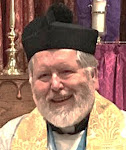Christ Church, Oxford, where Dr Mascall taught from 1945 until 1962
One of the “must reads” of our time is Saraband: The Memoirs of E.L. Mascall (published in 1992). Apart from being an extremely enjoyable and entertaining collection of memoirs, it is as valuable a tool in understanding the flow of 20th century Church of England history as any of the “technical” histories available. The reason for this is two-fold. First, Mascall knew personally so many of the key players, and they cross his pages as real people with strengths, weakness and idiosyncrasies. He brings them alive. He writes gently, with great humour, but also at times he takes the micky! Second, Mascall’s work is a very astute commentary from a Catholic perspective of the direction Anglican theology was taking during his lifetime, and I think that we ignore his observations to our peril.
I share with you today some words Mascall wrote in Saraband (p.78) on the Catholic movement within the Church of England. On all counts they are sobering. (I have broken Mascall’s paragraph into smaller ones.)
The chief weakness of the Catholic Movement was, I believe, the assumption that all church people had imbibed with their mother’s milk, or at any rate, learnt at their mother’s knee, nine tenths of the Catholic religion without knowing what it was, and that all that was needed to turn them into fully informed Catholics was to add a few admittedly very important extras concerning confession, the real presence, prayers for the dead and the veneration of the saints. It was just not understood that, while there is (or, rather, was) a vast common area of belief that is common to Catholicism and that vaguely delineated attitude that the average Englishman referred to when he described himself as a Protestant, Catholicism is a view of reality and a way of life that form an integrated and coherent whole.
That the Incarnation of the Eternal Word is not a past episode but a continuing reality, that God has taken our nature so that we might be taken into his, that nature is really transformed by grace and not merely adorned by it - such pervasive and orientating essentials of Catholicism seem to have been simply taken for granted by our scholars.
The consequence being that, instead of penetrating the Church as a whole, they have been first ignored, then forgotten, and finally treated as irrelevant.
Today we have arrived at a situation in which, when both the Trinity and the Incarnation are denied by prominent members of the clergy, the accredited guardians of the Faith, while adopting the ornaments of Catholicism and expressing approval of the achievements of the Catholic Movement, cannot be persuaded that the preservation of the basic truths of the Faith is sufficiently important to justify their intervention. Many of the parish clergy are sensitive to the situation; and they feel badly let down not only by the bishops but by the scholars.


















1 comments:
If the essentials of Catholicism were seen as irrelevant in the early 1960s, how much worse are things for Anglo-Catholics today. The laity in so many parishes suffer from a lack of real teaching. It is little wonder that so many can't see what's wrong with women priests and bishops as well as same sex marriage. Those priests and bishops who should be speaking up for the truth are often afraid to raise their head above the parapet for fear of persecution or ridicule.
As has been said in this blog recently, beware of letting the world set the church's agenda. "If the world hates you, know that it has hated me before it hated you." (John 15:18)
Post a Comment